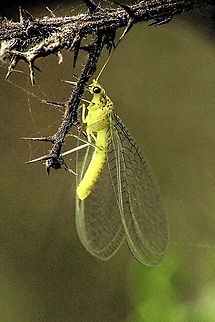
Appearance
In Dictyochrysa the vein M forks regularly in two branches running parallel. No Pseudomedia is formed. The discal area of the wing has a dense nervature forming an even pattern of relatively small hexagonal cells. D. peterseni is rather more yellowish-green with distinct black markings, notably with black markings on the head below the antennae, lacking in D. fulva and D. latifascia.Naming
The species was first described by Kimmins in 1952 and named in honour of the Danish entomologist Peter Esben-Petersen, the author of the genus Dictyochrysa who had erected the genus in 1917 based on the type species Dictyochrysa fulva.References:
Some text fragments are auto parsed from Wikipedia.